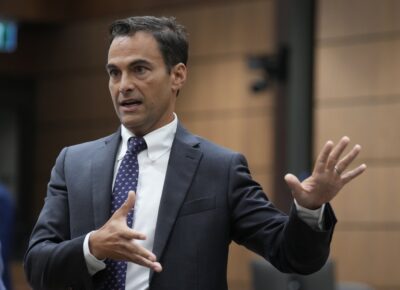Budget watchdog sounds alarm about Ottawa’s ‘unsustainable’ fiscal path
By Canadian Press on September 25, 2025.

OTTAWA — “Stupefying,” “shocking” and “unsustainable” — those were just some of the words Ottawa’s fiscal watchdog used Thursday to describe his scathing forecast for federal finances ahead of a long-anticipated fall budget.
Interim Parliamentary Budget Officer Jason Jacques published an updated economic and fiscal outlook on Thursday where he projected the federal deficit would balloon to $68.5 billion this year, up from an estimated $51.7 billion last year.
He also expects the federal debt-to-GDP ratio — previously a major fiscal anchor for Ottawa — will no longer decline in the coming years.
Jacques told a parliamentary committee Thursday afternoon it is the first time in 30 years he has seen a projection where that key metric rises over time.
Based on public statements from federal officials, spending plans announced over recent months and a weakening economy in the U.S. trade war, he said the path for federal finances appears broadly “unsustainable.”
“I think everybody should be concerned,” Jacques told MPs on the government operations and estimates committee.
“We’re hoping, and certainly expecting, the government as part of Budget 2025 to clearly indicate what the government plans to do to address … this problem, because it’s certainly not sustainable.”
The PBO is a non-partisan officer of parliament. The office’s updated fiscal and economic outlook offers parliamentarians a baseline estimate of the state of federal finances heading into the Liberals’ fall budget on Nov. 4.
Finance Minister François-Philippe Champagne on Thursday defended the pace of spending in the upcoming budget as necessary to pivot the economy through a “once-in-a-generation” disruption tied to the United States’ global tariff campaign.
“The parliamentary budget officer can have his own view,” he said after the Liberal cabinet meeting.
“My role is to ensure the long-term fiscal stability of Canada and make sure the investments are there to support the Canadian economy for generations to come.”
Champagne pointed to fiscal anchors in the Liberal election platform this past spring — among them, a declining deficit-to-GDP ratio and balancing the operational spending budget in three years — as benchmarks of prudent fiscal management in the upcoming budget.
A fiscal anchor is a guiding principle that governments can point to in their budgets to show they’re prudently managing public finances, particularly debt.
The previous Liberal government under former prime minister Justin Trudeau set an anchor of capping the annual deficit at one per cent of GDP and maintaining a declining debt-to-GDP ratio.
The PBO report forecasts that Ottawa will blow past those anchors in the upcoming budget.
The outlook does show that, after projecting an expansion in the deficit-to-GDP ratio to -2.2 per cent this year from -1.7 per cent last year, Canada’s deficit as a share of GDP is expected to shrink in the years to come.
The PBO expects deficits to decline slightly but to remain close to $60 billion annually over the forecast horizon. The Liberals projected a deficit of $42.2 billion for this fiscal year in its most recent update last December.
The watchdog’s update does not include plans to incrementally ramp up defence spending to meet the updated NATO benchmark of five per cent of GDP by 2035. It also doesn’t factor in Ottawa’s announced plans to reduce public service spending over the next three years.
Kristina Grinshpoon, the PBO’s director of fiscal analysis, told the committee that she believes there’s about $20 billion of proposed spending included in the Liberals’ spring election platform that’s not included in the office’s updated outlook.
But the report does account for some $115.1 billion in net new spending over five years announced by the government since the last fiscal update in December of last year.
Higher government spending is coming as the PBO expects tax revenues to take a hit from weaker economic growth this year and next.
Champagne on Thursday blamed the higher deficit on the global trade disruption.
“With everything that’s happened in the world, when you look at the deficit of Canada, a large part of that is in response to what has happened,” he said.
Prime Minister Mark Carney has described the Liberals’ approach to the budget as one of spending less to invest more. He has promised to ramp up infrastructure spending and attract investment to boost productivity in Canada.
Conservative Leader Pierre Poilievre accused Carney of breaking his promise to “spend less” during question period Thursday. He called Carney a more expensive prime minister than his predecessor, Trudeau.
“We know that every single dollar this prime minister spends comes out of the pockets of hard-working Canadians,” Poilievre said.
“Why don’t they know that?”
Jacques was named parliamentary budget officer on a six-month interim basis earlier this month, before the House of Commons began its fall sitting.
A permanent appointment must be approved by the House, and the Conservative party has pushed to keep Jacques in the role.
This report by The Canadian Press was first published Sept. 24, 2025.
Craig Lord, The Canadian Press
34-33




